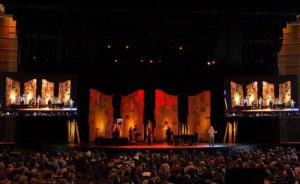 The testimony of Pastor Paul Carter – original source here.
The testimony of Pastor Paul Carter – original source here.
I began pastoring in September of 1994 – right in the middle of the seeker sensitive craze. The first two churches I worked in were 100% on board with the program. We were contemporary, we were targeted, we had good signage and all our core values started with the letter ‘G’ – we were as seeker friendly as it was humanly possible to be.
Both those churches are gone now and the movement itself appears to be in terminal decline.
It was a season of my life but I am very glad that it is over.
There were a lot of good people in the movement and some very admirable motivations behind it but as I reflect on my experience it seems to me that the model was always doomed to fail for at least these 7 simple reasons.
1. Because you get what you fish for
The basic logic of the seeker sensitive movement was that we would get people in the door by playing contemporary music, singing contemporary songs, speaking contemporary jargon and addressing contemporary issues. Then at some unspecified point in the future we would transition into more meaty and substantial things.
It was your basic bait and switch operation and as you might imagine it never really worked out in practice.
The bottom line is that what you win people with is what you have to keep people with. If you market yourself as a church for people who don’t like church, then you can’t do churchy things without expecting significant pushback.
This is why most seeker churches never managed to exit the theological merge lane. If you sell them on Christianity Lite then you need to continue to offer Christianity Lite week after week after week. The logic of seeker church traps you in a spiritual reenactment of Waiting For Godot.
Count me out.
I’m all for front doors, but I’m also all for kitchens, hallways and dining rooms. Eventually you have to get to the meat but in the seeker churches I was a part of, it seems like we never did.
2. Because small groups aren’t the church
Of course the theory was that we would get to the meat in Small Groups. That was our mantra. We said that Sunday church was for visitors now and Small Groups would be for us. That’s what we said, but in truth I’m not sure how many of us ever believed that.
I must confess that I have had very few positive experiences in a Small Group. Most of the Small Groups I was forced to be a part of followed the same basic script. We got together, somewhat begrudgingly, once every other week except over the summer and anytime our meeting fell within 5 days of a Statutory Holiday. Which meant practically that we met 14-16 times a year.
We’d spend 15-20 minutes chatting and eating small cookies. Then there would be “a study”. The study was usually led by someone who had prepared while we were eating small cookies. His or her leadership usually involved reading the selected passage and then asking some version of the question: “So what do you guys think about that?” What people thought about that was often deeply disturbing. Thankfully the content portion was inevitably interrupted by the high needs person who insisted on turning every Small Group gathering into a personal therapy session. I usually zoned out during this portion of the meeting and fantasized about playing in the NHL.
After that we prayed, ate more cookies and went home.
It was generally not a transformative experience and it was certainly not a legitimate experience of church.
Small Group is not church.
Small Group is small and groupy – most of the Small Groups I was part of were organized around geography and demography – meaning we were all the same age and we all lived in the same middle class suburban neighbourhoods.
That’s not church.
Church is young and old, rich and poor, black and white, well educated and working class sitting side by side under the preached word of God and responding with praise, prayer and repentance. Continue reading
